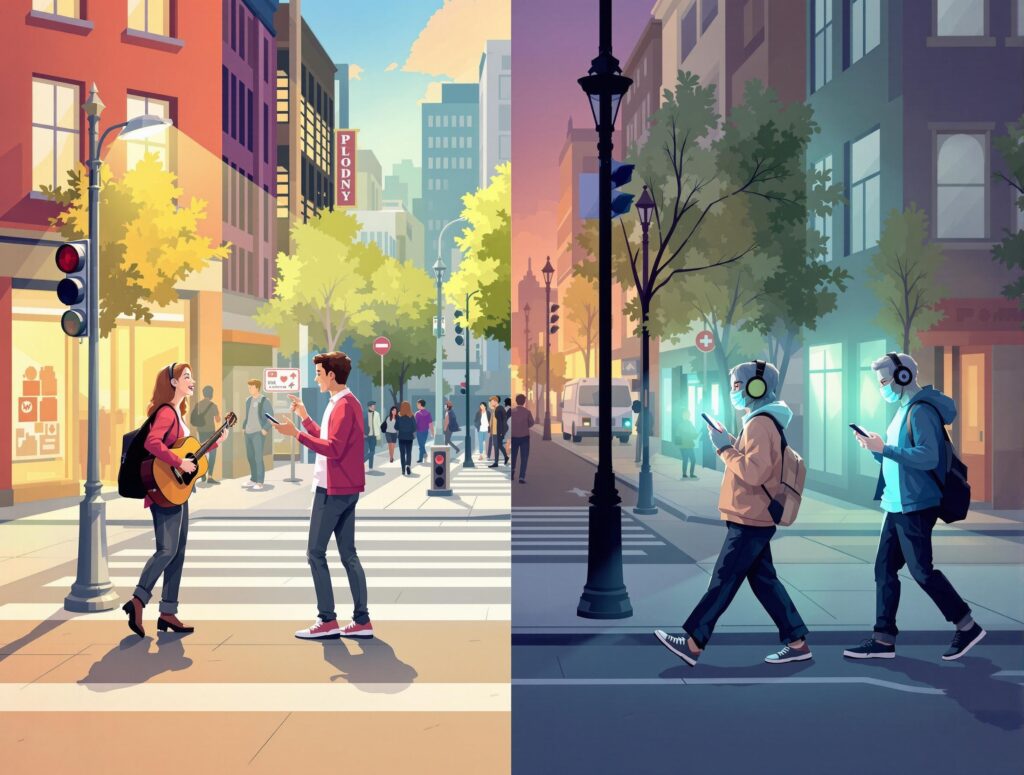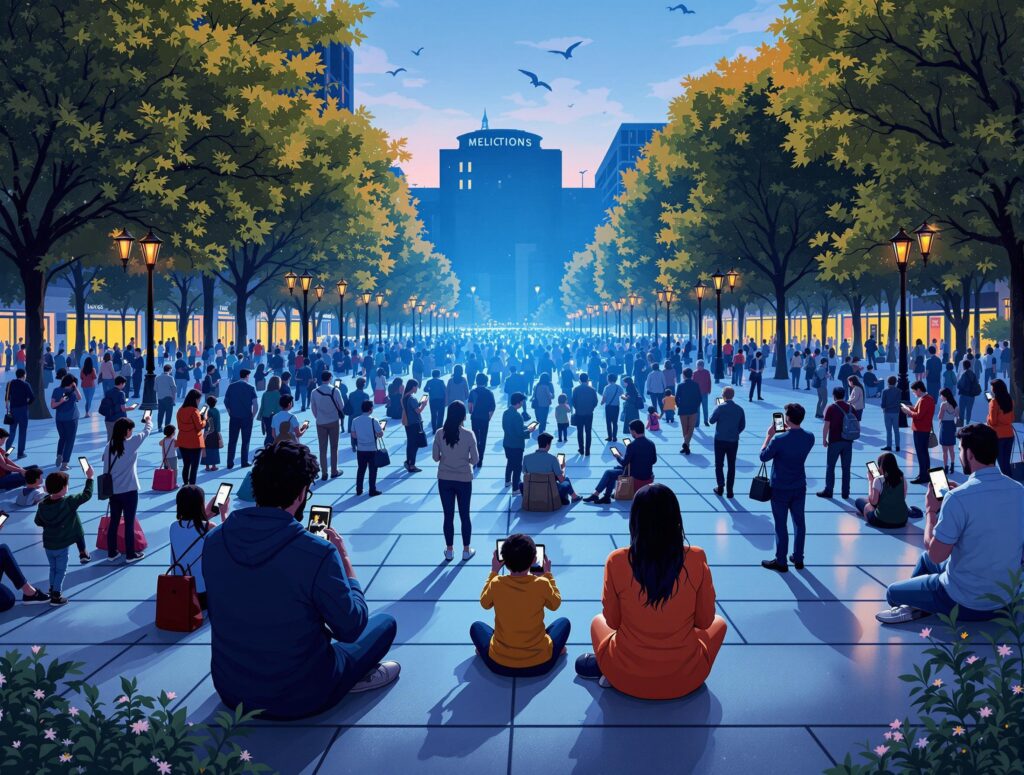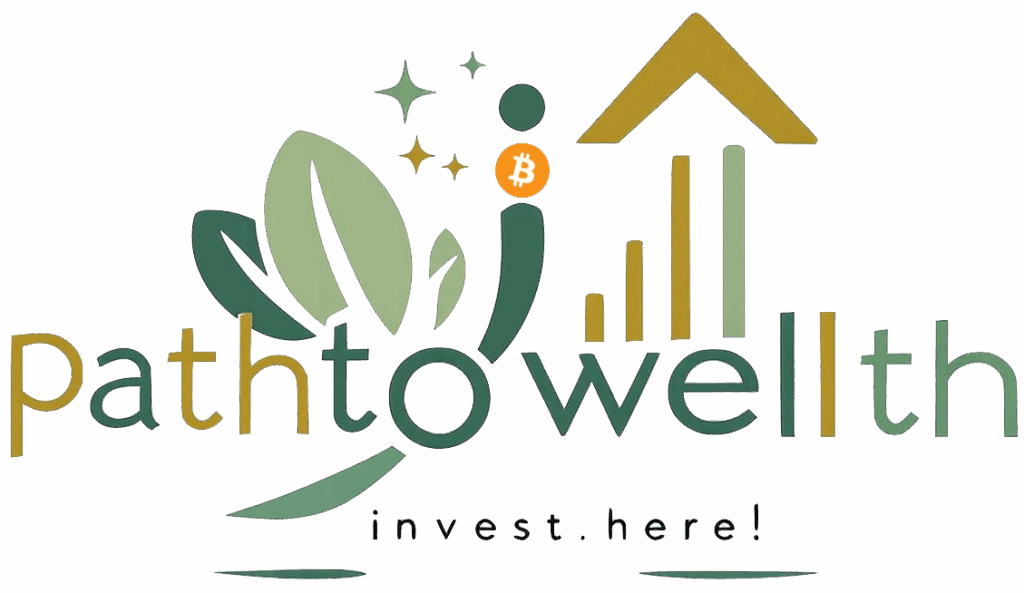We humans are naturally social creatures. For thousands of years, we’ve thrived on small moments of connection—a nod of recognition, a friendly wave, spontaneous conversations with strangers. But something’s changed, and we all know what it is.
Two Stories, Same Street

Let me tell you about Maya and Alex having two very different experiences on the same Tuesday morning.
Story #1: Present and Available
Maya steps out with her phone tucked safely in her bag. At the crosswalk, she finds herself waiting next to Alex, who’s also taking in the morning scene. They both notice a street musician setting up nearby.
“Think he’s going to play requests?” Maya asks with a grin.
Alex chuckles. “If he does, I’m voting for something from the ’90s.”
They chat for the entire light cycle—about music, the neighborhood, and street performers. When the light changes, they walk together for another block, discovering they both frequent the same bookstore. They exchange recommendations and a friendly goodbye at the corner.
Both arrive at their destinations energized, carrying warmth from that unexpected human moment.
Story #2: Digitally Distracted
Maya steps out, immediately pulling out her phone to check Instagram. At the crosswalk, she stands next to Alex, who’s deep in a Twitter thread. Maya’s watching cat videos while Alex reads market predictions, both wearing earbuds.
The street musician starts playing a beautiful acoustic version of “Wonderwall,” but neither hears it. They walk in the same direction for a block, never once looking up from their screens.
They part ways without ever knowing they shared those moments together. Maya arrives feeling anxious from doom-scrolling news. Alex gets to work feeling scattered from jumping between apps.
Both missed what could have been a lovely, energizing human connection.
What We’re Really Losing
Here’s what gets me: people worldwide now spend over 5 hours a day on their phones—more time than we spend sleeping! And 86% of smartphone users check their devices while having conversations with friends and family.

But it’s not just about missing new connections—we’re also becoming unavailable to the people who already matter to us. Think about it: when you’re absorbed in your phone, you’re sending a clear signal to everyone around you that whatever’s on that screen is more important than they are. Your friends see you scrolling and think twice about sharing something that’s on their mind. Your family members hesitate to interrupt what looks like “important” phone business.
Being preoccupied doesn’t just make us miss opportunities for new friendships; it makes us less approachable to the people who want to connect with us right now. When we’re mentally elsewhere, we’re not available for the spontaneous conversations, the moments when someone needs to talk, or the simple pleasure of being fully present with the people we care about.
Research shows that constant smartphone use is rewiring our brains, making real-world social interaction harder. We’re losing practice at reading facial expressions, picking up on social cues, and engaging in spontaneous conversation.
When did you last strike up a conversation with someone in line at the store? Or make small talk with your neighbor? These interactions might seem trivial, but they’re crucial for our mental health and sense of community.
Studies find that even brief, positive interactions with strangers boost our mood, increase feelings of belonging, and reduce stress. That friendly chat with the barista, the smile with a fellow dog walker—these moments create a sense that we’re part of something bigger.
The Good News: We Can Turn This Around

Social skills are just that—skills. They get stronger with practice. We haven’t lost our fundamental need for connection; we’ve just gotten out of practice.
Start small. Put your phone away during your morning walk. Make eye contact with people you pass. Say “good morning” to neighbors. Ask the cashier how their day is going—and actually listen.
These aren’t life-changing friendships, but they’re life-enhancing moments that remind us we’re part of a community.
Your Challenge: One Week of Presence
For one week, commit to being fully present during one daily activity. Maybe your morning coffee run or lunch break walk. Put the phone away, take out the earbuds, and see what happens.
You might notice something beautiful you’ve been walking past for months, have an unexpected conversation that brightens your day, or simply feel more grounded and connected.
Reclaiming Our Social Instincts
The next time you’re waiting somewhere—in line, at a red light, for your coffee order—resist the urge to fill that space with your phone. Let yourself be bored for a minute. Be a hobbit. As we explored in our post about simplifying life’s daily decisions, sometimes the most powerful choice is embracing simplicity and slowing down. Look around. Smile at someone.

After all, we’re all just walking each other home on this strange, wonderful journey called life. Why not enjoy the company along the way?


